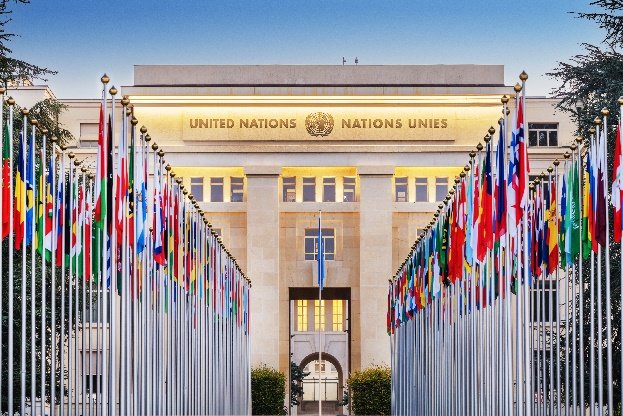Decolonization
Decolonization refers to the process by which colonial territories gained independence from European imperial powers, leading to the formation of sovereign nations, primarily in Asia, Africa, the Middle East, and the Caribbean. This process was marked by political struggles, nationalist movements, armed conflicts, and international diplomatic efforts. While decolonization had begun in the 18th and 19th centuries in regions like Latin America and North America, the 20th century saw a rapid wave of decolonization, particularly after World War II (1945–1990s). 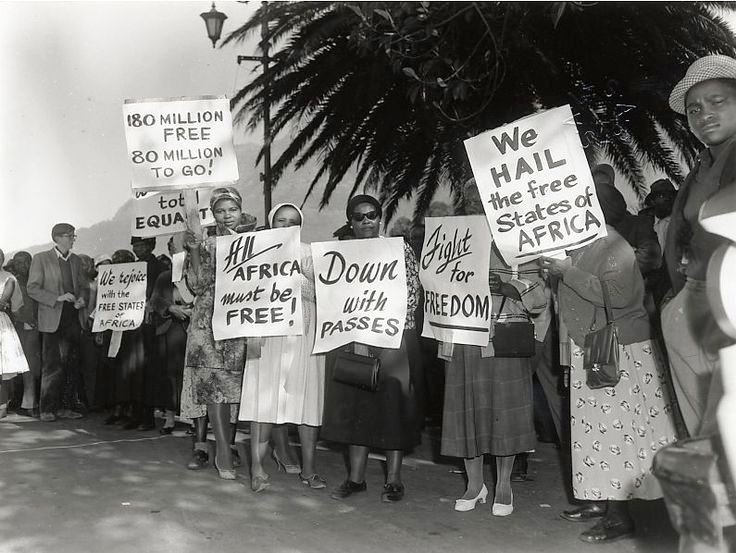
Decolonization did not always lead to immediate stability, as many nations struggled with economic dependence, political instability, and ethnic conflicts post-independence.
Factors Leading to Decolonization
The process of decolonization was driven by multiple interconnected factors, including economic decline of colonial powers, rise of nationalist movements, Cold War rivalries, impact of World War II, and international pressure through the United Nations (UN). These forces collectively weakened the colonial system, paving the way for independence across Asia, Africa, and the Caribbean.
1. Economic Weakness of Colonial Powers
- Post-World War II Financial Crisis: European colonial powers like Britain, France, the Netherlands, and Belgium were financially devastated by World War II. The cost of war reconstruction at home made it increasingly difficult to maintain colonies.
- Decline in Economic Benefits from Colonies: Colonies that were once sources of cheap raw materials and markets for European industries became expensive to govern due to growing resistance, uprisings, and administrative costs.
- Shift in Trade and Global Economy: The emergence of the United States and the Soviet Union as economic superpowers reduced the dependence of European economies on their colonial possessions. The U.S. encouraged free trade and open markets, making colonial economic structures outdated.
- Labor Strikes and Economic Disruptions in Colonies: Many colonies experienced worker strikes, economic boycotts, and production slowdowns, making colonial rule less profitable. For example, strikes in British-controlled India, Ghana, and Malaya hurt colonial economies.
2. Rise of Nationalist Movements 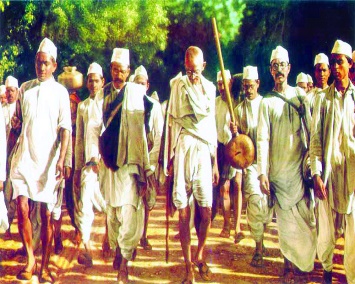
- Growth of Anti-Colonial Struggles: The early 20th century saw the rise of nationalist movements advocating for self-rule, led by figures like Mahatma Gandhi (India), Ho Chi Minh (Vietnam), Sukarno (Indonesia), Jomo Kenyatta (Kenya), and Kwame Nkrumah (Ghana). These movements used mass protests, civil disobedience, guerrilla warfare, and diplomatic negotiations to push for independence.
- Political Awakening and Indigenous Leadership: Many nationalist movements formed political parties, trade unions, and student groups to demand representation and self-governance. Organizations like the Indian National Congress (INC), Viet Minh (Vietnam), and FLN (Algeria) played crucial roles in mobilizing people.
- Role of Intellectuals and Media: Newspapers, radio broadcasts, and anti-colonial literature spread nationalist ideas, increasing awareness about colonial exploitation and the need for independence.
- Impact of WWII Veterans: Many colonial soldiers who fought for European powers in World War II returned home demanding rights and self-rule, leading to widespread anti-colonial activism.
3. Role of the Cold War 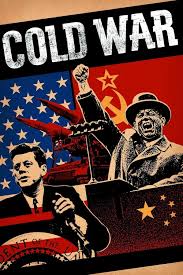
- U.S.-Soviet Rivalry and Anti-Colonial Pressure: The Cold War intensified global calls for decolonization, as both the United States and the Soviet Union opposed traditional colonialism for different reasons.
- U.S. Opposition to European Imperialism: The U.S. supported self-determination, fearing that continued European colonial rule would push newly independent countries towards communism. The U.S. also sought economic access to new markets, rather than allowing European countries to dominate trade with their colonies.
- Soviet Union’s Anti-Imperialism Campaign: The USSR actively supported anti-colonial struggles, promoting socialist revolutions in Africa, Asia, and Latin America to expand its ideological influence. It provided weapons, training, and financial aid to movements in Vietnam, Angola, and Algeria.
- Cold War Proxy Wars in Decolonization: Many independence struggles turned into Cold War battlegrounds, where the U.S. and USSR backed opposing factions. The Vietnam War, Korean War, and conflicts in Africa were examples of decolonization turning into ideological and military struggles.
4. Impact of World War II
- Decline of European Dominance: The destruction caused by World War II weakened European global supremacy, making it difficult for Britain, France, and the Netherlands to maintain control over vast colonial territories.
- Inspiration from Japan’s Challenge to Colonialism: Japan’s military victories in Southeast Asia (Malaya, Indonesia, and the Philippines) during WWII showed that European rule was not invincible, inspiring nationalist movements.
- Formation of Nationalist Resistance Movements: During the war, many nationalist leaders and resistance groups gained military experience, making them stronger opponents of colonial rule. For example, Vietnam’s Ho Chi Minh and Indonesia’s Sukarno had already built resistance networks during the war.
- Atlantic Charter and U.S.-British Agreement (1941): The U.S. and Britain issued the Atlantic Charter, which promoted the principle of self-determination, giving legitimacy to independence movements worldwide.
5. International Pressure and the United Nations
- The UN’s Support for Decolonization: The United Nations (UN), established in 1945, became a major platform for colonial territories to demand independence. It pressured European powers to grant sovereignty and introduced policies supporting self-rule.
- Declaration on the Granting of Independence (1960): The UN General Assembly passed Resolution 1514, which formally recognized self-determination as a fundamental right, accelerating the decolonization process.
- Role of the UN Special Committee on Decolonization (1961): The committee monitored colonial situations, supported independence movements, and mediated conflicts between colonial governments and nationalist groups.
- Support from Newly Independent Nations: Countries that had already gained independence, such as India, Egypt, and Ghana, supported decolonization movements in other regions by raising issues at the UN and providing diplomatic and financial aid.
Decolonization in Asia
Asia was one of the first regions to witness large-scale decolonization, with several nations gaining independence following World War II. The process was marked by nonviolent resistance, armed struggles, diplomatic negotiations, and Cold War influences. The transition from colonial rule varied from peaceful handovers to violent conflicts, shaping the political landscape of modern Asia.
Anti-Colonial Struggle in India (PYQ 2014)
The anti-colonial struggle in India was influenced not only by internal factors but also by significant political, economic, and social developments in the global arena. These developments shaped nationalist consciousness and strengthened the demand for independence.
Political Developments
- Impact of World Wars: Indian participation in both World Wars created political awareness and exposed colonial exploitation.
- Russian Revolution (1917): The success of communism inspired Indian leaders to challenge imperialism.
- Rise of Nationalism: The rise of nationalist movements in Asia and Africa (e.g., Egypt and China) encouraged Indian leaders to intensify their struggle.
Economic Developments
- Economic Exploitation: British colonial policies drained India’s wealth through high taxation, land revenue systems, and trade monopoly.
- Global Economic Crisis (1929): The Great Depression deepened poverty and unemployment in India, fuelling resentment against British rule.
- Industrialization and Labour Movements: Growth of industries and trade unions fostered organized resistance against colonial economic exploitation.
Social Developments
- Racial Equality Movements: The rise of civil rights movements in the US and Africa highlighted racial injustices, strengthening India’s anti-colonial resolve.
- Education and Modernization: Western education exposed Indians to democratic ideals, liberty, and equality, fuelling nationalist aspirations.
- Formation of International Bodies: The establishment of the League of Nations and emerging discourse on self-determination inspired Indian leaders to seek independence.
Global political, economic, and social changes in the early 20th century played a crucial role in shaping India’s anti-colonial struggle by exposing colonial exploitation and strengthening nationalist movements.
India’s Independence (1947)
- Gandhi’s Nonviolent Struggle: Mahatma Gandhi’s leadership in the Indian National Movement played a crucial role in achieving independence from British rule. His methods of nonviolent resistance (Satyagraha), civil disobedience, and mass protests mobilized millions against British policies.
- Nehru’s Political Leadership: Jawaharlal Nehru, as the leader of the Indian National Congress (INC), advocated for self-rule, industrialization, and socialism. He played a key role in negotiations with Britain and later became India’s first Prime Minister.
- Partition and Independence (1947): British India was divided into India and Pakistan due to communal tensions between Hindus and Muslims. The partition led to widespread violence, mass migrations, and strained India-Pakistan relations.
- Impact of India’s Independence: India’s decolonization inspired anti-colonial struggles across Asia and Africa, providing diplomatic and material support to nationalist movements.
Decolonization of Malaya Peninsula (PYQ 2017)
The Malay Peninsula, under British colonial rule since the early 19th century, underwent a complex decolonization process influenced by nationalist movements, communist insurgency, and political restructuring.
Key Phases
- British Colonial Rule: British established control through treaties with local sultans; Federated Malay States (1895) and Straits Settlements formed key administrative units.
- Rise of Nationalism: Formation of UMNO (1946) opposed the Malayan Union, leading to the creation of the Federation of Malaya (1948).
- Malayan Emergency (1948–1960): Communist insurgency by the Malayan Communist Party (MCP) led to military suppression and political reforms.
- Independence (1957): Federation of Malaya gained independence on August 31, 1957 under Tunku Abdul Rahman.
- Formation of Malaysia (1963): Malaya merged with Singapore, Sabah, and Sarawak to form Malaysia, but Singapore exited in 1965 due to political and ethnic tensions.
Problems Germane to the Decolonization Process
- Ethnic Tensions: The Malay Peninsula had a diverse population of Malays, Chinese, and Indians, leading to political and social divisions.
- Communist Insurgency: The Malayan Communist Party (MCP) waged a violent insurgency, destabilizing the political environment.
- Economic Dependence: Heavy reliance on rubber and tin exports made the economy vulnerable to global market fluctuations.
- Political Fragmentation: Balancing power among ethnic groups and political factions posed a challenge to political stability.
- Malayan Emergency (1948–1960): Communist insurgency by the MCP led to military suppression and political reforms.
- Independence (1957): Federation of Malaya gained independence on August 31, 1957 under Tunku Abdul Rahman.
- Formation of Malaysia (1963): Malaya merged with Singapore, Sabah, and Sarawak to form Malaysia, but Singapore exited in 1965 due to political and ethnic tensions.
The decolonization of the Malay Peninsula was shaped by nationalist movements, political reforms, and ethnic diversity, resulting in the formation of modern Malaysia.
Vietnam (1954)
- French Colonial Rule and Nationalist Resistance: Vietnam, Laos, and Cambodia were part of French Indochina. After World War II, the Viet Minh, led by Ho Chi Minh, fought against French colonial rule.
- First Indochina War (1946–1954): The war between the Viet Minh and the French resulted in heavy casualties, with the decisive Battle of Dien Bien Phu (1954) leading to French defeat.
- Geneva Accords (1954) and Division of Vietnam: The Geneva Conference granted independence to Laos, Cambodia, and Vietnam. However, Vietnam was temporarily divided at the 17th parallel into North Vietnam (communist, led by Ho Chi Minh) and South Vietnam (U.S.-backed, led by Ngo Dinh Diem).
- Impact on Cold War Politics: The division of Vietnam triggered the Vietnam War (1955–1975), as the U.S. intervened to prevent a communist takeover, making Vietnam a Cold War battleground.
China (1949) 
- Fall of the Qing Dynasty and Civil War: After the fall of the Qing dynasty (1911), China saw a power struggle between the Chinese Communist Party (CCP), led by Mao Zedong, and the nationalist Kuomintang (KMT), led by Chiang Kai-shek.
- Communist Victory in 1949: After World War II, the civil war resumed, resulting in the Communist Revolution (1949), with the establishment of the People’s Republic of China (PRC) under Mao Zedong. The nationalists retreated to Taiwan, forming the Republic of China (ROC).
- China’s Support for Decolonization: The PRC supported anti-colonial and communist movements across Asia, providing arms, training, and financial aid to groups in Vietnam, Korea, and Malaya.
- Influence on Cold War Conflicts: China’s rise as a communist power intensified Cold War tensions in Asia, leading to proxy wars like the Korean War (1950–1953) and the Vietnam War (1955–1975).
Decolonization in Africa
Decolonization in Africa was driven by economic hardships, nationalist movements, armed resistance, and international pressure. The process varied across the continent, with some nations achieving peaceful transitions, while others fought bloody wars for independence. Many newly independent African nations faced political instability, ethnic conflicts, and Cold War interventions, shaping their post-colonial struggles.
1. Ghana (1957)
- British Rule and Nationalism: Ghana (formerly the Gold Coast) was a British colony that saw growing demands for self-rule in the early 20th century.
- Kwame Nkrumah and the Independence Movement: Kwame Nkrumah, a strong nationalist leader, led the Convention People’s Party (CPP), organizing strikes, protests, and civil disobedience against British rule.
- Peaceful Path to Independence (1957): Britain, facing economic challenges and rising nationalism, granted Ghana independence on March 6, 1957, making it the first African country to gain independence.
- Post-Independence Impact: Ghana became a symbol of African liberation, inspiring other nationalist movements across the continent. Nkrumah promoted Pan-Africanism, but his government faced economic troubles and a coup in 1966.
2. South Africa
- British and Dutch Colonial Rule: South Africa was colonized by the Dutch (Boers) and the British, leading to racial segregation and the establishment of white minority rule.
- Apartheid System (1948–1994): The National Party (1948) implemented Apartheid, enforcing strict racial laws that excluded Black South Africans from political and economic rights.
- Anti-Apartheid Struggle:
 The African National Congress (ANC), led by Nelson Mandela, organized protests, strikes, and armed resistance. The Sharpeville Massacre (1960) and Soweto Uprising (1976) intensified the global anti-apartheid movement.
The African National Congress (ANC), led by Nelson Mandela, organized protests, strikes, and armed resistance. The Sharpeville Massacre (1960) and Soweto Uprising (1976) intensified the global anti-apartheid movement. - International Sanctions and Pressure: The United Nations, U.S., and global activists imposed economic sanctions and diplomatic isolation on the Apartheid regime, forcing reforms.
- End of Apartheid and Independence (1994): Due to internal resistance and international pressure, President F.W. de Klerk released Nelson Mandela (1990) and negotiated democratic reforms, leading to South Africa’s first free elections in 1994, with Mandela becoming President.
- Post-Independence Challenges: South Africa faced economic inequality, high crime rates, and racial tensions, though it remained one of Africa’s strongest economies.
Decolonization in the Middle East
Decolonization in the Middle East was shaped by European mandates, Arab nationalism, Cold War rivalries, and religious-ethnic tensions. Unlike Africa and Asia, many Middle Eastern states gained early independence after World War I but remained under indirect British and French control. The post-World War II era saw the rise of nationalist movements and conflicts over borders, sovereignty, and regional influence.
- Egypt (1952):Egypt was a British protectorate (1882–1952), with the Suez Canal being a key strategic route. Nationalist resentment grew after World War II. The Free Officers’ Coup (1952), led by Gamal Abdel Nasser and Muhammad Naguib, overthrew King Farouk and ended British influence. Nasser nationalized the Suez Canal in 1956, leading to the Suez Crisis, where Britain, France, and Israel attacked Egypt but were forced to withdraw due to U.S. and Soviet pressure. Nasser’s leadership inspired Arab nationalism and anti-colonial movements across the Middle East.
- Palestine-Israel Conflict (1948–Present) :
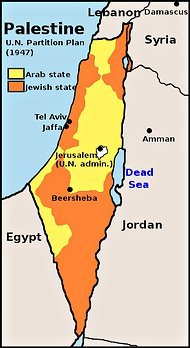
Decolonization Under a British mandate after World War I, Palestine became a centre of Jewish immigration and Arab resistance, especially after the Balfour Declaration (1917). Britain withdrew in 1948, and the UN proposed a partition plan to create separate Jewish and Arab states. Jewish leaders accepted the plan, but Arab nations rejected it, leading to the 1948 Arab-Israeli War. Israel declared independence and expanded its territory, displacing Palestinians (Nakba). Multiple wars (1956, 1967, 1973) followed, and the conflict remains unresolved, fuelling Middle Eastern instability and global tensions.
Decolonization in the Middle East was influenced by European mandates, Arab nationalism, and Cold War rivalries. Unresolved issues like the Palestine-Israel conflict and colonial borders continue to drive regional tensions.
Decolonization in the Caribbean and Latin America
Decolonization in the Caribbean and Latin America followed a unique path compared to Africa and Asia. While most Latin American nations gained independence from Spain and Portugal in the 19th century, many Caribbean nations remained under colonial rule until the mid-20th century. The United States played a major role through political, economic, and military interventions.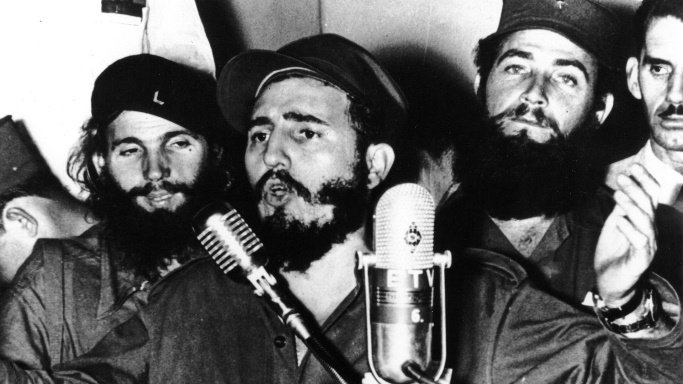
- Cuba (1959): Cuba was a Spanish colony until the Spanish-American War (1898), after which the U.S. controlled its political and economic affairs. Discontent with U.S.-backed dictator Fulgencio Batista led to Fidel Castro’s revolutionary movement (1953–1959). Castro’s victory in 1959 established a socialist state aligned with the Soviet Union. The failed Bay of Pigs Invasion (1961) and the Cuban Missile Crisis (1962) intensified Cold War tensions. Cuba supported leftist movements in Africa and Latin America, spreading socialist ideology.
- Decolonization of Central and South America: Most of Central and South America gained independence from Spain and Portugal by the 1820s through wars led by figures like Simón Bolívar. However, economic and political dependency on the U.S. and Europe persisted. The Monroe Doctrine (1823) allowed U.S. dominance in the region, leading to support for right-wing dictatorships (e.g., Pinochet in Chile). U.S. corporations like United Fruit Company controlled large sectors of Latin American economies. Leftist movements, inspired by the Cuban Revolution, emerged across the region, including the Sandinista Revolution (Nicaragua, 1979). U.S. interventions supported right-wing military regimes, causing political instability and civil wars.
Decolonization in the Caribbean and Latin America was influenced by U.S. policies, Cold War dynamics, and economic dependency. While peaceful independence occurred in some Caribbean nations, others like Cuba and Nicaragua experienced revolutions and U.S. interventions. Post-colonial challenges included political instability, economic struggles, and foreign influence, shaping the region’s modern trajectory.
Challenges Faced by Newly Independent Nations
After decolonization, many newly independent nations struggled with political instability, economic dependency, and social divisions. The legacy of colonialism, Cold War pressures, and neocolonial control made the transition to self-governance difficult.
- Political Instability and Civil Wars – Colonial rule left behind weak political structures, causing power struggles, military coups, and authoritarian regimes (e.g., Mobutu in Zaire, Saddam Hussein in Iraq). Civil wars erupted in Nigeria (Biafra War), Congo, and Sudan, often turning into Cold War battlegrounds with U.S. and USSR involvement.
- Economic Dependency and Neocolonialism – Newly independent states remained economically dependent on former colonial powers, relying on raw material exports (e.g., oil in Nigeria). Western-controlled multinational corporations and IMF-imposed Structural Adjustment Programs (SAPs) maintained economic dominance, causing debt crises and economic instability.
- Ethnic and Religious Conflicts – Arbitrary colonial borders fueled ethnic and religious tensions, leading to conflicts like the Partition of India (1947), Rwandan Genocide (1994), and Lebanon’s sectarian violence (1975–1990).
- Military Influence and Arms Race – Former colonial powers and superpowers armed rival factions, turning post-colonial states into proxy battlegrounds during the Cold War (e.g., conflicts in Africa and Asia).
- Social and Cultural Impact – Colonial legacies influenced language, education, and legal systems, creating divisions and identity struggles (e.g., English in India, French in West Africa).
The challenges faced by newly independent nations, including political instability, economic underdevelopment, and social fragmentation, hindered their path to stable governance and growth. Overcoming these challenges required strategic reforms, nation-building efforts, and international cooperation.
Impact of Decolonization on Global Politics
Decolonization reshaped global politics by creating new nations, shifting power dynamics, and influencing Cold War rivalries. It led to the rise of the Third World, Cold War conflicts, and new regional alliances.
- Emergence of the Third World:
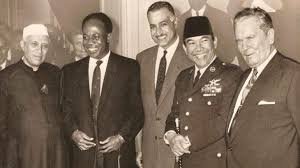 Decolonization led to the creation of new nations in Asia, Africa, and the Caribbean, forming the Third World. The Non-Aligned Movement (NAM) was founded in 1961 by Nehru (India), Tito (Yugoslavia), and Nasser (Egypt) to avoid Cold War alignment and promote economic independence. NAM encouraged South-South Cooperation through trade and technological collaboration (e.g., G77, NIEO). However, many NAM countries faced political instability and Cold War pressures.
Decolonization led to the creation of new nations in Asia, Africa, and the Caribbean, forming the Third World. The Non-Aligned Movement (NAM) was founded in 1961 by Nehru (India), Tito (Yugoslavia), and Nasser (Egypt) to avoid Cold War alignment and promote economic independence. NAM encouraged South-South Cooperation through trade and technological collaboration (e.g., G77, NIEO). However, many NAM countries faced political instability and Cold War pressures. - Cold War Conflicts: The U.S. and USSR competed for influence in newly independent nations through economic aid and military support. Proxy wars like the Korean War (1950–53), Vietnam War (1955–75), Angolan Civil War (1975–2002), and Afghanistan War (1979–89) reflected this rivalry. The U.S. formed NATO, SEATO, and CENTO, while the USSR created the Warsaw Pact and backed communist regimes.
- Formation of Regional Organizations:

Asean The African Union (AU) was established in 1963 (as OAU) and reformed in 2001 to promote African unity, economic development, and peacekeeping. ASEAN was formed in 1967 to strengthen economic and security cooperation in Southeast Asia. OPEC was founded in 1960 to control oil production and pricing, reducing Western dominance (e.g., 1973 Oil Crisis).
Conclusion
Decolonization marked the end of European imperialism, leading to the emergence of newly independent nations and reshaping global politics, economies, and societies. It fostered new alliances like NAM, AU, and ASEAN, but also triggered Cold War conflicts, civil wars, and economic struggles. Many post-colonial states continue to face neocolonial influence, economic dependency, and territorial disputes. While decolonization granted political sovereignty, the fight for true economic independence and global equality remains ongoing in the 21st century.
Related FAQs of Decolonization
Decolonization refers to the process by which colonies gained independence from European colonial powers, mainly during the 20th century, particularly after World War II. It involved nationalist movements, political negotiations, wars of independence, and international diplomacy, leading to the creation of new sovereign states in Asia, Africa, the Middle East, and the Caribbean.
The key causes of decolonization include the economic decline of European powers after World War II, rise of nationalist movements, impact of World War II, anti-colonial struggles, Cold War rivalries between the USA and USSR, and growing pressure from international organizations like the United Nations supporting self-determination.
Newly independent nations struggled with political instability, civil wars, economic dependency on former colonial powers, ethnic and religious conflicts, weak governance structures, neocolonialism, and Cold War interference. Many countries also faced border disputes due to arbitrary colonial boundaries.
The Cold War intensified decolonization as both the USA and USSR supported anti-colonial movements for strategic influence. The USA promoted self-determination to prevent the spread of communism, while the USSR backed liberation struggles to expand socialism. Many independence struggles turned into proxy wars, like in Vietnam, Angola, and Korea.
Decolonization reshaped global politics by ending European imperialism, creating new nation-states, fueling nationalist movements, and altering global power dynamics. It led to the rise of the Third World, formation of organizations like the Non-Aligned Movement (NAM), African Union (AU), and ASEAN, while highlighting ongoing struggles for economic independence and global equality.

